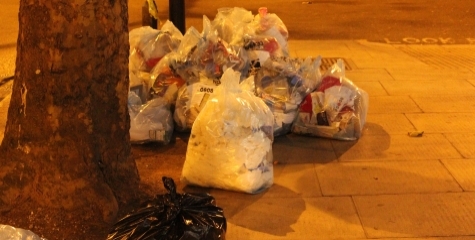Cities are lunch for plastic bag-bugs

Issue (WIWE) status: Submitted, Unpublished
Wild Card's progress: Fully-fledged
This Wild Card came from:
European Commission Framework Programme for RTD
The theme/scheme related to this Wild Card:
Theme 6 - Environment (including Climate Change)
The sub-theme that best relates to this Wild Card:
Environment and health
Likelihood timeframe and scenario features :
now-2050
Wild Card's description:
Synthetic organisms are developed for use in the industrial production of plastics, both to extend product life and to accelerate environmental bio-degradation. The latter varieties prove difficult to control and in some tests are seen to attack many types of plastics. There are sudden fears that omnivorous ‘plastic bag-bugs’ could rapidly consume all the plastics in the built environment and so the material basis of society: these are compounded by official secrecy, media paranoia, inadequate regulation, and financial speculation.
Nano-environment technology innovations to preserve plastics are adopted far too rapidly and widely. While an immediate result might be to encourage even worse pollution and landfill (“we will be able to clear this up cheaply tomorrow”), increased efforts to deal with the problem may turn out to be counterproductive. New ways of encouraging plastic degradation are discovered but inadequately assessed – for example, living organisms evolve or escape from their contained environments, beginning to destroy the useful plastics and other materials in everyday life, not just waste products. The material basis of civilisation begins to be threatened, and some serious disasters ensue as, for instance, foods are contaminated, hospital equipment dissolves.
 (1 Rates)
(1 Rates)iKNOW has been featured in the media and several research projects:
DIE ZEIT (Germany), Financial Times (Germany), El Heraldo (Colombia), Prospective Foresight Network (France), Nationalencyklopedin (Sweden), EFP - European Foresight Platform (EC), EULAKS - European Union & Latin America Knowledge Society (EC), CfWI - Centre for Workforce Intellience (UK), INFU - Innovation Futures (EC), Towards A Future Internet (EC), dstl - Defence S&T Laboratory (UK), EFSA - European Food Safety Agency (EU), Malaysia Foresight Programme (Malaysia), Bulletins Electroniques more...